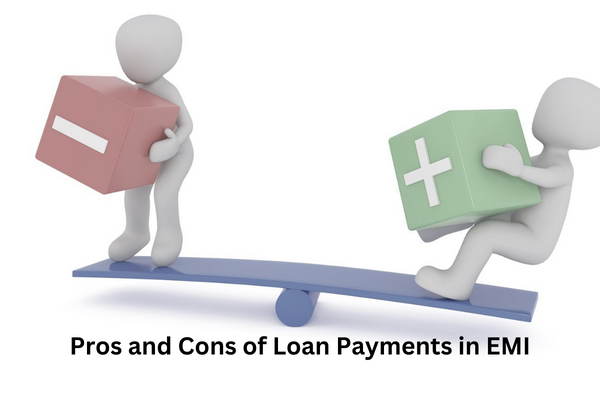A loan repayment term is known as an EMI, or Equated Monthly Installment. It is a quick and easy way to repay any type of loan. A loan obtained from a bank or an NBFC is typically repaid in monthly installments. These fixed financial installments are referred to as EMIs.
The principal loan amount, loan term, and interest rate all contribute to the EMI. This monthly installment, also known as loan repayment, is supposed to be paid to the bank by cheque or electronically on a set date.
There are advantages and disadvantages to consider before applying for a personal loan in EMI. Here’s what you should know before renting one.
- EMI Loans are personal or commercial loans that must be repaid in regular installments or payments.
- The borrower repays a portion of the principal borrowed as well as interest on the loan with each installment payment.
- Auto loans, mortgage loans, personal loans, and student loans are all examples of installment loans.
- Flexible terms and lower interest rates are among the benefits of installment loans.
The Benefits of EMI:
- Freedom to Purchase Expensive Utilities: EMI allows consumers to purchase expensive utilities that they would not be able to buy otherwise. Whether it’s expensive household items, a vehicle, wedding gifts, jewelry, or a house itself, EMI can help you buy it all. Customers make purchases and reap the benefits because they can divide the cost into monthly installments and pay it off easily. This benefits not only buyers of such expensive utilities but also traders and sellers. For the average person, EMIs are like a suspension system.
- Easy on the wallet: The EMI scheme allows the borrower to pay the loan in monthly installments. The amount is determined by the principal loan amount, the loan term, the interest rate, and the borrower’s ability to repay. This makes it easier for borrowers to pay off the loan in small monthly installments. As a result, they do not have to cut back on their monthly expenses in order to afford various expensive utilities.
- Online loan repayment for IIFL: You can make IIFL quick payments online with no hassles using Bajaj Finserv’s platform. IIFL Finance is a leading Non-Banking Financial Company (NBFC) that provides loans for gold, business, personal, and other purposes. IIFL online EMI payment via the Bajaj Finserv app is convenient because Bajaj Finserv does not charge transaction fees. Because their platform is secure, you can quickly pay IIFL loans online without worrying about your privacy or safety. If you have taken out a gold loan, you can expect to receive an instant IIFL gold loan payment and a confirmation message within minutes.
- Banks’ Flexible EMI Options: Many banks now offer borrowers flexible EMI options. The EMIs are adjusted and determined based on the borrower’s requirements. The borrower chooses the installment and term that are most convenient for him or her.
- Plan payments using EMI calculators: Online EMI calculators allow you to calculate your monthly outflow based on the principal amount, the interest rate charged, and the time horizon. Planning for other expenses and investments from your income is simple.
- There are no middlemen: the EMI is paid directly to the lender, with no involvement of multiple parties handling your payments.
Repayment of EMI disadvantages:
- Longer Debts: Borrowers must pay monthly installments or EMIs until the principal amount and applicable interest rate are paid off. Home loans and personal loans can have terms ranging from 20 to 30 years. That means that a borrower will spend nearly half of his or her life repaying loan payments. This prevents the borrower from purchasing any other luxurious utilities in the near future.
- No Early Repayment: If a borrower wishes to repay the loan sooner than expected by using extra savings or a bonus, banks do not provide an easy way to do so. Many banks and NBFCs charge such borrowers early repayment fees. Even if the borrowers could, it would be difficult for them to pay off the loan sooner.
- Charges for Missed EMIs: If a borrower forgets or fails to pay an EMI on or before the due date, banks and NBFCs charge late fees. When it comes to EMI repayment, banks and NBFCs have strict rules. Skipping multiple EMIs may result in legal action or the bank seizing the borrower’s collateral.
- Effect on creditworthiness: Missing EMI payments will also have a negative impact on your credit score
- Additional costs: in addition to the interest cost, financial institutions may charge a processing fee if you choose an EMI scheme.
Conclusion
An equated monthly installment (EMI) is a method of repaying a loan in installments rather than in one lump sum. The amount you pay as loan EMI is determined by factors such as the principal amount, loan tenure, and interest rates.


